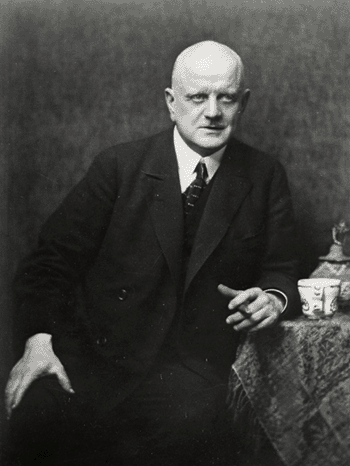Stay in the Loop
BSR publishes on a weekly schedule, with an email newsletter every Wednesday and Thursday morning. There’s no paywall, and subscribing is always free.
Reconsidering Sibelius

Jean Sibelius was one of the most honored composers of the 20th century. He was known for his orchestral works — symphonies, tone poems, and a violin concerto — yet the only local commemoration devoted entirely to him on the 150th anniversary of his birth was a song recital by Lyric Fest. (Yannick Nézet-Séguin led the Philadelphia Orchestra in his short Finlandia in November.)
Sibelius was inextricably linked with Finnish nationalism; his tone poem Finlandia is like a patriotic hymn. Most of his compositions sound astringent and bleak, like his country’s climate. He mimics nature with recurrent patterns and cyclical structure, building sonic masses from microscopic material. His gradual, incremental evolution of relentless formations of sound gave the Finns a sense of heroic antiquity rooted in the brooding nature of their homeland.
He was viewed as a hero during World War II, despite Finland’s alliance with Germany. In 1939, Finland resisted a military attack by the Soviet Union, which signed a friendship pact with Hitler. Then the Soviet Union and Germany simultaneously attacked Poland from either side; the Finns thought they might be next. As a show of support, Americans started playing Finlandia on classical and pop music stations, at concerts and in churches.
As things turned out, Hitler left Finland alone and moved against France, Holland, and Belgium in 1940, then turned on the Soviet Union in June of 1941. The Finnish government signed an alliance with Germany, and Great Britain declared war on Finland on December 6, 1941. Americans seemed to overlook that — other events gained their attention on December 7. The enthusiasm for Finlandia and Sibelius’s symphonies didn’t disappear, though; they were played frequently throughout the war and the composer was hailed for resisting all tyranny.
How much of a Nazi was he?
Sibelius merits musical esteem, but he may not deserve the hero worship he received. Sibelius scholar Timothy L. Jackson points out that Sibelius accepted a Goethe Medal from Adolf Hitler and during the war he drew a generous German pension. Finnish Sibelius authority Vesa Sirén, the editor of the official Sibelius website, objects: "Keep in mind that we are talking about a bald-headed old man with shaky hands and a cataract in his eye who probably didn't even know what the SS was." (That quote comes from this piece in The Chronicle of Higher Education.)
It’s clear to me that Sibelius valued his acclaim in Germany, and he actively sought to receive performance royalties from Germany during the war, but I see no evidence that he shared Nazi beliefs. Sibelius wrote in his diary in 1943: “Anti-Semitism and the like is something that at my age I cannot condone. My upbringing and breeding don’t fit in with the times.”
“Second-rate composer on an off afternoon”?
Like his reputation as a patriot, Sibelius acquired his reputation as a major composer early on. His seven popular symphonies were written between 1899 (when he was 34) and 1924, when, at age 59, he stopped composing. Despite bouts of depression and alcoholism, he lived until 1957, when he died at age 91.
And like his reputation as a patriot, his musical reputation was challenged after his death. Musicologist Tim Page wrote that “Much of his chamber music, a lot of his songs and most of his piano music might have been churned out by a second-rate salon composer from the 19th century on an off afternoon.” In addition, Page wrote, “at his very best, he is often weird.”
I don’t agree. Many of Sibelius’s songs are wonderfully concise and dramatic. They are rarely performed because of the difficulty of the Finnish and Swedish languages in which he wrote, not because of the quality of his work.
Weird, or just a contrarian?
I also don’t agree that he’s weird, but he surely was a contrarian. Even when his texts were romantic, rather than sad, Sibelius wrote irregular, jagged melodies, imbuing his songs with mixed messages. Yes, I am in love; no, it will bring unhappiness and might not last. He typically warned that sorrow was lurking nearby.
His song about spring is pessimistic: “Spring is swift to fly away; winter is longer,” he writes. “For now, let’s just kiss” — but while those words are romantic, the piano accompaniment is dark.
If one song could epitomize Sibelius’s style, it is Northland (Norden). It sounds chilly, with major and minor chords clashing, as the words speak of homesickness and “seeking refuge.” His song described “Northland's dusky forests; ancient, mysterious, brooding, savage.”
DuPlantis and the other artists at the Lyric Fest celebration presented a dozen of these songs in their original languages. The vocals and the piano accompaniment were sterling. As usual at their concerts, the singers and pianist gave explanations of what they were performing.
What, When, Where
Sibelius at 150. Anne Marie Frohnmayer, soprano; Suzanne DuPlantis, mezzo-soprano; Anthony Schneider, bass. Laura Ward, pianist. Lyric Fest concert. December 8, 2015, at the Academy of Vocal Arts, 1920 Spruce St., Philadelphia. lyricfest.org
Sibelius in the Old and New World: Aspects of His Music, Its Interpretation, and Reception. Edited by Timothy L. Jackson, Veijo Murtomäki, Colin Davis, and Timo Virtanen. Peter Lang Publishing Group, 2010. Available at Amazon.
Sign up for our newsletter
All of the week's new articles, all in one place. Sign up for the free weekly BSR newsletters, and don't miss a conversation.

 Steve Cohen
Steve Cohen